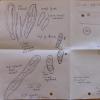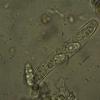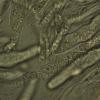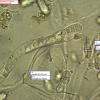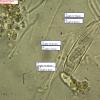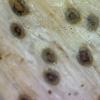
15-02-2026 04:32
One more specimen that is giving me some descent a

14-02-2026 22:45
Hy!I would ask for some help determing this specie

09-02-2026 14:46
Anna KlosGoedemiddag, Op donderdag 5 februari vonden we ti

14-02-2026 19:09
Valencia Lopez Francisco JavierHola colegasEstoi interesado en este articulo, Agn

13-02-2026 18:05
Margot en Geert VullingsOn February 9, 2026, we found these small hairy di

14-02-2026 10:58
 Bernard CLESSE
Bernard CLESSE
Bonjour à toutes et tous,Pourriez-vous m'aider à

13-02-2026 03:30
Hello! I found these immersed perithecia on a stic

12-02-2026 21:34
patrice CallardBonjour, la face inférieure des feuilles ce certa

11-02-2026 22:15
 William Slosse
William Slosse
Today, February 11, 2026, we found the following R

During the project of fungi on dead stems in the Bavarian Forest we found quite often, on a lot of different logs, an ascomycete I can not at all identify. I had some ideas but all of them did not fit, finally. Intesting: most collections were on Abies, but it grew on Fagus also!
I give pictures of macroscopical habit and of asci with spores. IKI did not obtain any reaction (neither apical apparatus nor ascus wall or anything else).
Who can provide me with an idea?
Regards from Lothar

das ist sicherlich Exarmidium inclusum. Frag mich aber nicht wieso....
Hier der Link zu Bildern:
https://www.cubbyusercontent.com/pl/Exarmidium/_581525577608441c8e2d0bbc708715d2
Gruß
Zotto

Hallo Zotto,
wow - es ist ja nicht so, dass ich nicht wusste, dass Du der Beste bist, aber dieser neue Beweis ist nicht von schlechten Eltern. Vielen vielen Dank!
Ich habe eben im Index of Fungi nachgesehen und festgestellt, dass die Art zu den Hypocreales (Hyponectriaceae) gehört. Ich habe ja an etlichen Stellen im Ascomyceten-System "gesucht", aber eine Hypocreales hätte ich nicht vermutet. .....
Ganz liebe Grüße nach Tübingen - momentan aus dem Hainich - von
Lothar

Interesting species I would not have recognised too.
Are the asci bitunicate or thick-walled? And how can we be sure that we have to do with the one or the other ascus type? I guess I am not the only one who struggles with this problem.
Bernard

I am actually not familiar with most groups of pyrenpomycetes. This Exarmidium was repeatedly found, and it was an issue in this forum several times. So please search fr the genus in Ascofrance and you will perhaps get answers of some of your questions.
Lothar: I am not sure if Hyponectriaceae belongs in Hypocreales. In my Cubby folders I have it in Xylariomycetidae. But in the unpublished list of families (Syllabus) I see that Walter Jaklitsch has the genus in Xylariales inc. sedis, while Hyponectriaceae (Xylariales) contains only Hyponectria.
When I see at the available photos in my folder, I do not think that the ascus is bitunicate, though it is distingtly thickwalled also laterally. Bitunicate is a bad term because many ascus types have thick endoasci. To clarify whether it is fissitunicate would require to see an ascus during spore discharge.
Zotto

thank you very much for the additional informations about Exarmidium and about your sight on the ascus problem.
Hi Zotto and Bernard,
I was not sure if the ascus is fissitunicate when I examined it, so I looked in different groups of Ascomycetes for the fungus. The asci were quite short as long as the spores where unripe but became a lot elongated with ripe spores.
Best regards from Lothar
